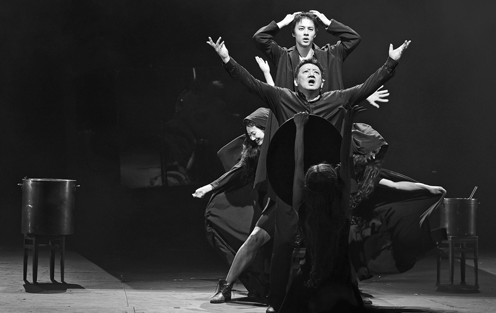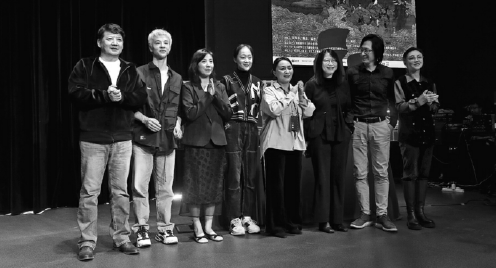Faust among equals
Chinese stage adaptation of Goethe's classic tale returns to theaters refreshed after pandemic-imposed hiatus, Chen Nan reports.

In 2019, the established Lithuanian theater director Rimas Tuminas worked with Chinese artists on his adaptation of Johann Wolfgang von Goethe's epic, Faust. The Chinese play was premiered in Nanjing, Jiangsu province, on Dec 6, 2019, and was warmly received and it later toured China.
However, with the arrival of COVID-19, in early 2020, the tour was brought to an abrupt halt.
"We tried to bring the production back to the theater but the plan was canceled over and over again, which was very disappointing," says producer Lei Ting, adding that, during the past three years, the production's composer Faustas Latenas, and one of the actors, Sun Bo, had died.
In January, when live theater returned, the producer decided to reinstate the play and discussed her ideas with the director. However, Tuminas was battling a second bout of cancer and he couldn't travel to Beijing.
"Soon, we decided to go to Tel Aviv, Isreal, where the director worked and received medical treatment," says Lei. "It was a crazy idea but we made it." In July, the creative team, about 18 people, traveled from Beijing to Tel Aviv, where they worked for about one month.
On Dec 6, Lei appeared at the New Tsinghua Xuetang, an auditorium located in Tsinghua University, to announce the new tour of Faust.
"On the same date in 2019, the play was premiered and now, it returns," says Lei with excitement, adding that she purposefully chose to wear the same outfit that she wore on the day of the play's premiere. "We've been through a lot, but the idea of bringing this production back to the stage has never changed."
On Dec 9 and 10, Faust was staged at the New Tsinghua Xuetang as part of the ongoing Tsinghua Philosophy Drama Festival, which, initiated by the university and running from Nov 15 to Dec 31, explores the relationship between philosophy and drama.
In 2024, the Chinese play will embark on a nationwide tour, including a stop at Beijing's Poly Theater on May 9.
According to Lei, the director recreated a version of Faust because he was inspired by the new cast members and his own life experience.
"The new version exudes energy, humor and the director made it much easier for the audience to comprehend," Lei says.
In the new version of the play, actor Yin Fang plays the role of Mephistopheles, the demon, while Wang Yanhui plays the role of Faust.
Goethe's Faust took the German poet and dramatist 64 years to complete from 1768 to 1832. It was published in 1832, the year of his death. It begins with a bet between Mephistopheles and God that he will be able to turn one of his servants, an intelligent scholar named Faust, over to evil. God agrees, believing that Faust will remain a loyal follower. The demon then tries to convince Faust to sell his soul in exchange for unlimited knowledge and pleasure.
"The play came to me when I was trying to slow down my acting career," says veteran actor Wang, 54, who is known for his roles in Chinese movies, such as Dying to Survive by director Wen Muye in 2017, and TV dramas, such as The Little Reunion by director Wang Jun in 2019.
"But I was tempted by it, not only because of the famous director, but also because of my longtime wish to return to theater performance," says Wang, adding that he started his acting career in 1989 by performing with Yunnan Drama Theater. "When I read the script of Faust, I didn't quite understand it. Even now, after the rehearsals, I still cannot understand it. It might take years or even the entirety of my life to explore everything the myth of Faust can teach me."
"I can still recall the first few days in Tel Aviv, when we rehearsed with the director, which was a process of looking for direction. The director, though battling cancer, was focused and tried to find ways to inspire us to think about the way we played the characters. It was an eye-opening experience for me, even though I have some experiences in movies and TV dramas," says Yin, 37.
In 2014, Yin played the leading character, a young rocker, in the Chinese movie Blue Sky Bones, which was the directorial debut of Cui Jian, known as the "godfather of Chinese rock music". Before launching his career as an actor, he was a dancer and choreographer.
"My experience as a dancer allowed me to express and portray the role of the demon, who is cultivated, witty, and cynical, through lots of movement," he adds. Yin also notes that it was a very rewarding experience to work with Tuminas, who inspired him to act like never before.
After the rehearsals in Tel Aviv, the team also conducted more rehearsals via video conference.
"I am surprised by Wang Yanhui's performance, who has added a great sense of humor to the production. His humor allows the audience to better understand the story," Tuminas says of Wang's performance.
As for Yin, the director says: "He looks very young, which gives a freshness to Mephistopheles, who has lived for thousands of years. Yin fits the role, reminding the audience that he lives forever and never ages a day."
The director also says that theater is a place for people to think and he hopes that the play will inspire the audience to reflect, discuss and to think.
As the winner of the State Prize of the Russian Federation and of the National Prize of Lithuania, Tuminas has directed more than 20 plays in different theaters and countries.
Lei, who met the director when his productions of The Three Sisters and Madagascar were being staged in Beijing in 2016 and 2017. Soon, the two agreed to create a Chinese play.
Chinese audiences are familiar with the director, who first brought his work to China in 2016. The director's stage production of Eugene Onegin for the Vakhtangov Theatre toured the country in 2019.



Today's Top News
- Xi taps China's deep wisdom for global good
- New rules aim for platforms' healthy growth
- Chinese web literature grows overseas
- Postgrad exam trend points to thoughtful approach
- World's highest urban wetland a global model
- How China's initiatives are paving a new path to a better world






























